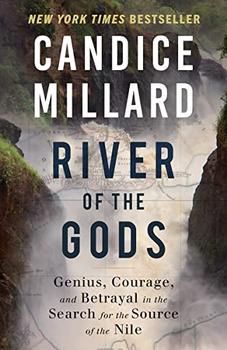Summary | Excerpt | Reviews | Beyond the Book | Readalikes | Genres & Themes | Author Bio

Genius, Courage, and Betrayal in the Search for the Source of the Nile
by Candice Millard
Although the members of the Royal Geographical Society were impressed by Burton's achievements, most had reservations about this unusual young man who seemed to be British in name only. Burton had been born in Devon, on the English Channel, but he had spent far less time in his homeland than he had roaming the rest of the world. It was a pattern that had begun early in life, when his father, Joseph Netterville Burton, a retired lieutenant colonel in the British Army, moved his family to France before Richard's first birthday. Over the next eighteen years, he moved thirteen more times, briefly settling in towns from Blois to Lyons, Marseilles to Pau, Pisa to Siena, Florence, Rome, and Naples. By the time he was an adult, Burton, along with his younger siblings, Maria and Edward, felt less like a citizen of the world than a man without a country. "In consequence of being brought up abroad, we never thoroughly understood English society," he wrote, "nor did society understand us."
Not only did Burton not feel British, he had often been told, and never in an admiring way, that neither did he look particularly British. No one who met him ever forgot his face. Bram Stoker, who would go on to write Dracula, was shaken by his first encounter with Burton. "The man riveted my attention," Stoker later wrote. "He was dark, and forceful, and masterful, and ruthless. . . . I never saw anyone like him. He is steel! He would go through you like a sword!" Burton's friend, the poet Algernon Charles Swinburne, wrote that he had "the jaw of a devil and the brow of a god," and described his eyes as having "a look of unspeakable horror." Burton's black eyes, which he had inherited from his English-Irish father, seemed to mesmerize everyone he met. Friends, enemies, and acquaintances described them variously as magnetic, imperious, aggressive, burning, even terrible, and compared them to every dangerous wild animal they could think of, from a panther to a "stinging serpent." Equally striking were his thick black hair, his deep, resonant voice, and even his teeth, which may have inspired literature's most iconic vampire. Stoker would never forget watching, enthralled, as Burton spoke, his upper lip rising menacingly. "His canine tooth showed its full length," he wrote, "like the gleam of a dagger."
Burton had grown up fighting, from street brawls to school skirmishes to violent encounters with enraged tutors. Although his father had dragged his children from one European town to another, he wanted for them a British education, which began at a grim boarding school in Richmond. All that Burton remembered learning at the school, which he described as "the 'Blacking-shop' of Charles Dickens," was "a certain facility in using our fists, and a general development of ruffianism. I was in one perpetual scene of fights; at one time I had thirty-two affairs of honor to settle." When he and Edward were finally sent back to Boulogne, after an attack of measles killed several boys and shut down the school, they scandalized everyone on their ship by joyously celebrating the fact that they were leaving England at last. "We shrieked, we whooped, we danced for joy. We shook our fists at the white cliffs, and loudly hoped we should never see them again," he wrote. "We hurrah'd for France, and hooted for England; 'The Land on which the Sun ne'er sets—nor rises.' "
Burton's father taught him chess, but most of what he learned came from a succession of alternately terrifying and terrified tutors. No matter the subject, the tutors were given permission to beat their pupils, until the pupils were old enough to beat them back. In later years, Burton would express his sorrow for the incalculable harm done by "that unwise saying of the wise man, 'Spare the rod and spoil the child.' " As a teenager, he fought back. The poor, nervous musician Burton's parents hired to teach him violin—"nerves without flesh, hung on wires," as Burton would later contemptuously describe him, "all hair and no brain"—finally quit after his student broke a violin over his head.
Excerpted from River of the Gods by Candice Millard. Copyright © 2022 by Candice Millard. All rights reserved. No part of this excerpt may be reproduced or reprinted without permission in writing from the publisher.
Experience is not what happens to you; it's what you do with what happens to you
Click Here to find out who said this, as well as discovering other famous literary quotes!
Your guide toexceptional books
BookBrowse seeks out and recommends the best in contemporary fiction and nonfiction—books that not only engage and entertain but also deepen our understanding of ourselves and the world around us.